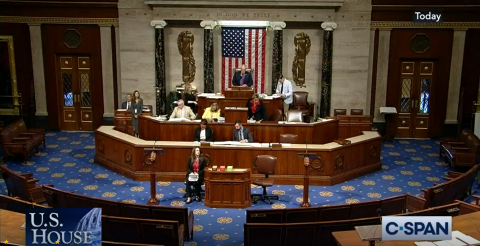
The House passed the National Defense Authorization Act in short order, largely along party lines, despite calls from faith groups and others to divert spending to human needs.
The following article was published in the July-August 2024 issue of NewsNotes.
The US House of Representatives voted (217-199) on final passage of the FY25 National Defense Authorization Act (NDAA), authorizing $883 billion for the Department of Defense, bringing the total discretionary defense topline up to $895 billion annually. The Rules Committee limited debate to only a handful of the hundreds of proposed amendments to the bill before calling for a floor vote. The amendments to included several “culture war” additions, such as returning a Confederate statue to Arlington and blocking climate action, resulting in the usually-bipartisan bill being passed largely along party lines.
MOGC worked with a coalition of faith-based and secular groups called People Over Pentagon to champion various amendments calling for greater accountability in military spending and diverting funds to address human needs. Most of these amendments were never considered. “Preposterously,” said Robert Weissman, president of coalition member organization Public Citizen, “the Republican-controlled Rules Committee refused to permit a vote on amendments that would have enabled an actual debate about spending levels for a bill that authorizes half the country’s discretionary budget.” Public Citizen is a nonprofit consumer advocacy organization focused on promoting what Catholics define as the common good.
“A functioning Congress would demand accountability, slash the Pentagon budget, and devote hundreds of billions in savings to priority human needs,” Weissman said, naming social concerns like addressing child poverty, transition to clean energy, and expanding Medicare. “Instead, a Congress indentured to the military-industrial complex rubberstamps a nearly $900 billion Pentagon budget, fast on its way to hitting $1 trillion.”
Representatives Mark Pocan (D-WI) and Barbara Lee (D-CA) offered an amendment to the bill that would have cut $100 billion from the already bloated Pentagon to free up funding for underfunded human needs priorities. However, the Rules Committee denied a floor vote on this amendment, stripping House Members of one of their primary annual avenues for standing against wasteful military spending and communicating their support for spending that could directly improve their constituents’ lives instead.
The Pentagon failed its sixth audit in 2023. It has never successfully accounted for the money it is given—a failure in accountability by the largest agency in the U.S. government.
In the last five years alone, the already bloated Pentagon topline has skyrocketed by more than $100 billion while other priority needs have gone un- or under-addressed.
According to the National Priorities Project, $100 billion could power every household in the United States with solar energy, hire one million elementary school teachers amid a worsening teacher shortage, or provide free tuition for 2 out of 3 public college students in the U.S. There is broad public support for investing in programs to help everyday people rather than the military-industrial complex.
Faith groups have long called for such a shift in national priorities, and in how we envision security – from an armed, national security model to an integral human security that seeks to strengthen diplomatic relations, disarm, meet the challenges posed by climate change, and provide healthcare, food, dignified work, housing, education, equity, and human rights both domestically and around the world.
In May, participants in Ecumenical Advocacy Days’ Spring Summit in Washington held a procession and vigil in front of the Pentagon, organized by MOGC and featuring a speech by Joyce Ajlouny, general secretary of the American Friends Service Committee. Ajlouny, a Palestinian American, spoke about the particular horrors of the ongoing war in Gaza as an example of the danger of militarization and addressing violence with more violence.
“Investing in peace actually works,” Ajlouny said. “This is money that could instead go to health care, housing, climate change, job programs and poverty elimination… Instead of investing in a community-centered future, the U.S. government continues to militarize the police and the world, no matter who is in the White House.”
Speaking to the astronomical Pentagon budget, Ajlouny pointed to the wider military-industrial complex: “Much of that money goes to weapons manufacturers” and to private development of technology “used for war and oppression.”
The NDAA will now have to pass the Senate, where the Democratic majority is unlikely to accept the most controversial amendments in the House bill. There is little sign that debate on accountability and topline spending amount will be more rigorous than it was in the lower chamber.
Faith in Action
Read about People Over Pentagon and the ongoing movement to shift spending priorities to nonviolent, integral human security. https://peopleoverpentagon.org/
Photo of the NDAA debate in the House courtesy of CSPAN.
